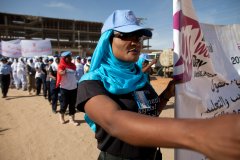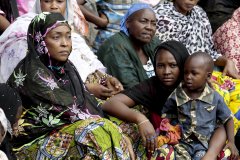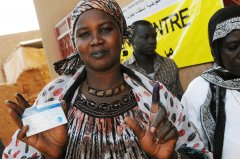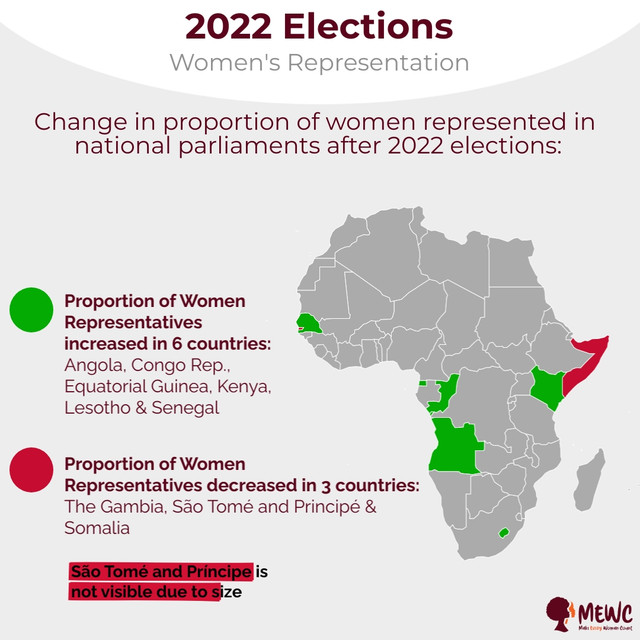Gender Issues Showlist
Women, Peace & Security
UNSCR 1325 calls on all parties to: protect and respect the rights of women and girls in conflict & post-conflict; increase women participation in all conflict resolution, peacekeeping and peace-building & to end impunity by prosecuting perpetrators of sexual and other violence on women and girls
index.php?option=com_content&view=category&id=56&Itemid=1913
Human Rights of Women
Thirty six years after the adoption of CEDAW, many women and girls still do not have equal opportunities to realize rights recognized by law. Women are denied the right to own property or inherit land. They face social exclusion, “honor killings”, FGM, trafficking, restricted mobility, early marriage,...
index.php?option=com_content&view=category&id=44&Itemid=1908
Violence Against Women
Violence against women is the most shameful human rights violation. Gender based violence not only violates human rights, but also hampers productivity, reduces human capital and undermines economic growth. It is estimated that up to 70 per cent of women experience violence in their lifetime
index.php?option=com_content&view=category&id=69&Itemid=1912
Political Participation & Leadership
Where women are fully represented, societies are more peaceful and stable. Women political participation is fundamental for gender equality and their representation in positions of leadership must be a priority for all Africans governments.
index.php?option=com_content&view=category&id=65&Itemid=1911
Latest News
- COTE D'IVOIRE: South-South Meeting to Promote Gender Equality and Combat Deforestation
- RWANDA: Rwanda Set to Launch Cervical Cancer Elimination Plan
- NIGERIA: Over 5,000 Nigerian Women Stranded in Iraq - Govt
- SUDAN: Healthcare Collapse Threatens Pregnant Women in Sudan's Sharg El Nil
- GHANA: President Nominates 12 More Ministers
- Senegal: Parliamentary election 2024
- Mauritius: Parliamentary election 2024
- Ghana: Presidential and Parliamentary Elections
- Botswana: Parliamentary elections 2024
- Algeria: Presidential Election 2024
SOUTH AFRICA: Spotlighting Gender Data At The First-Ever UN World Data Forum
Source: UN Women
At the first-ever United Nations World Data Forum in Cape Town, South Africa from 15 – 18 January, data and statistics experts from around the world will join governments, private sector, civil society and academia, in exploring innovative ways to measure progress on the Sustainable Development Goals (SDGs).
At the World Data Forum, UN Women together with Data2X will co-host an official event on “Gender Data for Decision-Making: Strengthening the Links”, highlighting the need for greater collaboration across all sectors towards the production and use of quality gender statistics.
With 80 per cent of the indicators for gender equality across the SDGs lacking data, statistics that adequately reflect the lived realities of women and men, girls and boys, are indispensable tools for monitoring progress and developing evidence-based policies and solutions to achieve gender equality and women’s empowerment.
The effective implementation and monitoring of the SDGs requires an unprecedented level of engagement from a multitude of stakeholders. The event will bring together national statisticians, public officials, civil society and data experts for a lively dialogue on what is needed to strengthen the collaboration between producers and users of gender data. The discussions will touch on a number of topics, including how to produce a shared vision for gender data at the national level; how to improve the capacities of gender specialists and statisticians vis-à-vis gender-sensitive data; and how gender data production and use can lead to improved policies and programmes on the ground.
The panel, moderated by Emily Courey-Pryor, Executive Director, Data2X, will include Purna Sen, Director, Policy Division, UN Women; Norah Madaya, Director, Statistics Coordination Services, Uganda Bureau of Statistics; Saara Romu, Senior Project Officer, The Bill and Melinda Gates Foundation; and Ineke Buskens, Project Leader and Research Director, GRACE Project.
UN Women will also present its recently launched flagship programme, “Making Every Woman and Girl Count”, a groundbreaking public-private initiative that will support countries to improve the production, accessibility and use of gender statistics over the course of five years.





